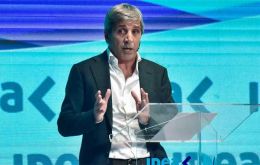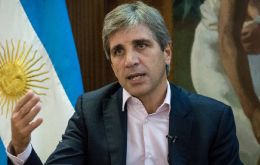MercoPress. South Atlantic News Agency
Tag: Luis Toto Caputo
-
Thursday, November 21st 2024 - 09:44 UTC
Argentina gets IDB and WB loans

Argentina's Libertarian Government has been granted loans from the World Bank (WB) and the Inter-American Development Bank (IDB) worth around US$ 4 billion, the Economy Ministry in Buenos Aires announced Wednesday. “The IDB and the World Bank approve financing for more than 4 billion dollars for projects in our country,” the ministry said in a statement.
-
Wednesday, November 13th 2024 - 10:46 UTC
Indec says Argentina's inflation in October stood at 2.7%

Argentina's National Institute of Statistics and Census (Indec) Tuesday announced that the Consumer Price Index (CPI) went up 2.7% in October, which represented a significant slowdown from previous months despite an interannual 193% increase and 107% in 2024 alone. October's inflation was the lowest figure in almost three years. In November 2021, it stood at 2.5%. September's inflation was 3.5%.
-
Friday, October 11th 2024 - 09:30 UTC
Argentine inflation stands at 3.5% in September

Argentina's National Institute of Statistics and Census (Indec) announced Thursday that September's Consumer Price Index (CPI)stood at 3.5% for a yoy total of 209%. So far in 2024, inflation reached 101.6%, with housing, utilities, and fuels accounting for the largest increases. Thursday's figures represented a slowdown from August's 4.2%. The Core CPI, which records inflation excluding seasonal and regulated prices, stood at 3.3%.
-
Wednesday, September 11th 2024 - 23:02 UTC
Argentina: Indec says inflation in August reached 4.2%

Argentina's Consumer Price Index (CPI) for the month of August went up 4.2%, the National Institute of Statistics and Census (Indec) announced Wednesday. The new figure represented a setback from July's 4% and a 236.7% interannual increase. So far in 2024, inflation reached 94.8%.
-
Monday, August 19th 2024 - 23:07 UTC
New shipment of Argentine gold abroad reported

A video of an armored truck carrying some 1500 gold bars from Argentina's Central Bank (BCRA) to the Ezeiza International Airport went viral Monday as the third such shipment -worth around US$ 250 million- was presumed to have left for London, it was reported in Buenos Aires. No special security was seen around the vehicle on the highway leading to the air terminal.
-
Thursday, July 25th 2024 - 19:50 UTC
Argentine Economy Minister meets with IMF Chief in Rio

Argentina's Economy Minister Luis Toto Caputo met Thursday in Rio de Janeiro with International Monetary Fund (IMF) Managing Director Kristalina Georgieva, who said the encounter had been “constructive.”
-
Friday, July 19th 2024 - 20:46 UTC
Caputo confirms Argentina shipped gold abroad

Argentina's Economy Minister Luis Toto Caputo confirmed rumors from opposition lawmakers and union leaders indicating that the Central Bank (BCRA) was transferring gold from the country's coffers to foreign destinations. He explained that the move sought to generate a return on an otherwise unproductive metal.
-
Saturday, July 13th 2024 - 08:02 UTC
Indec says Argentina's CPI in June reached 4.6%

The Consumer Price Index (CPI) reached 4.6% last month in Argentina for a year-on-year 271.5%, according to a National Institute of Statistics and Census (Indec) survey released Friday. These figures also yielded a 79.8% increase in the first semester of 2024.
-
Wednesday, June 19th 2024 - 20:14 UTC
Argentina: Milei reckons June's inflation to rebound

Argentine President Javier Milei admitted that his country's process of curbing inflation would be making “a pause” from the 4.2% the National Institute of Statistics and Census (Indec) announced for May this year. In addition to a rebound in the decline, there will be no zero deficit, the Libertarian leader also admitted.
-
Tuesday, June 11th 2024 - 22:17 UTC
World Bank foresees economic deterioration for Argentina this year

According to the latest “World Economic Outlook” report released Tuesday by the World Bank from its headquarters in Washington DC, Argentina's economy is expected to fall sharply this year, thus becoming the Latin American country going through the tightest contraction in the region before rebounding in 2025. The study projected a 3.5% drop this year followed by a 5% surge in 2025, thus outperforming the rest of the continent.
